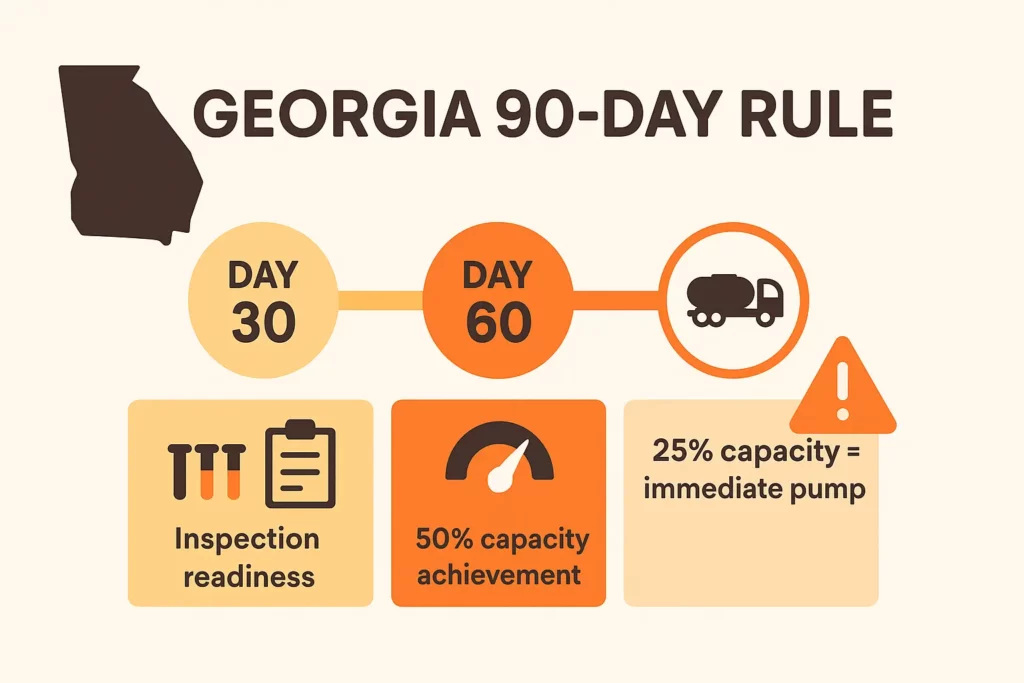Georgia’s school cafeterias and hospital kitchens juggle strict meal schedules, tight budgets, and the same 90 day grease trap pump rule that binds every food service facility in the state. This guide turns the rulebook into an actionable playbook: it explains Georgia statutes in plain English, shows food service directors how to price and calendar service, and folds grease recycling into STEM lessons that hit district sustainability targets. Use it to stay compliant, cut costs, and turn yesterday’s fries into tomorrow’s science fair fuel.
Table of Contents
Introduction Why This Matters Now
Georgia issues more FOG violations every summer peak cafeteria downtime than any other quarter. A failed re inspection can cost $100 per trap plus civil penalties. Atlanta alone mandates outdoor interceptors be pumped every 90 days, indoor units every 14. Pair that with the state’s Rule 391 3 6 .24 governing all FOG transporters, and compliance becomes non negotiable.
Georgia’s 90 Day Rule & Local Add Ons
Statewide, any trap holding more than 25 mg/L FOG must be serviced before reaching 25 % solids or every 90 days whichever comes first. Metro counties tighten the screw: Fulton’s Commercial Pretreatment team inspects schools unannounced and tracks manifests online. Missing paperwork triggers a $1,000 per day civil penalty and public health notice.

Budget & Calendar in Three Steps
First, map meal service peaks breakfast rush in K 5, late lunches in hospitals then slot cleaning for holiday or teacher work days to avoid menu disruption. Second, compare quotes: cleaning every 90 days averages $250 to $350 for 1,000 gallon traps, far less than an annual emergency pump out plus jetting. Finally, lock service in a purchase order that aligns with fiscal year closeouts.
| City | Typical 1,000 gal pump fee | Grease Program Contact | Learn more |
|---|---|---|---|
| Atlanta | $275 | Dept. of Watershed Mgmt. | Grease disposal Atlanta |
| Savannah | $260 | Water Resources FOG | Grease disposal Savannah |
| Augusta | $250 | Utilities FOG | Grease disposal Augusta |
(Rates averaged from 2024 to 2025 vendor quotes; confirm locally.)
Pick a “Used Collection Company,” Not a Hauler
Under Georgia law, transporters must hold a FOG manifest book and be listed with EPD; ask for the permit number on campus walk throughs. The best partners recycle oil into biodiesel that fuels school buses Gwinnett County powers five percent of its fleet this way, cutting CO₂ by 90 percent. Choose firms that bundle trap service with used oil rebates credited against the cleaning invoice.
Make Grease Recycling a Learning Moment
UGA Dining sends all oil for recycling and publishes the carbon savings in student dashboards. Springboard Biodiesel’s “Fuel the Bus” kit lets middle schoolers test viscosity and math out yield curves. USDA’s cafeteria waste audit guide pairs perfectly with FOG metrics for an integrated STEM unit. Georgia Recycling Coalition’s lesson plans show how to track gallons diverted and share results at board meetings. Invite local media when the first biodiesel batch powers a field trip bus great PR and grant leverage.

Step by Step Disposal Workflow
After last lunch tray, staff skims bulk fryers at ≤120 °F, filters crumbs, and empties oil into lockable rolling caddies. Manifest is pre filled with date, volume, trap ID. Custodial scans QR to log fill level. Our collection company swaps full tanks before 7 a.m. no missed breakfast service. Transporter signs the manifest; nutrition manager uploads it to county pretreatment portal within 24 hours. Fulton and Atlanta accept PDFs.
Rapid Fire FAQs
What if our trap fills before 90 days? Pump at 25 % solids; the law sets that ceiling independent of time.
Can students help? Yes Bartow County’s composting program proves kids can separate food scraps safely.
How is failure calculated? Inspectors measure inches of solids and grease. Surpass 25 % and you fail even if the calendar says day 60.
Conclusion & Next Steps
Schedule a compliance audit this week. Loop principals in on the recycling lesson plan, and request a biodiesel case study kit from your collection company. Post your first year data during Earth Month; nothing cements a program like student led results. For district wide service, compare rates in Atlanta, Savannah, Augusta, Macon, Columbus, and Athens to lock in volume pricing.









